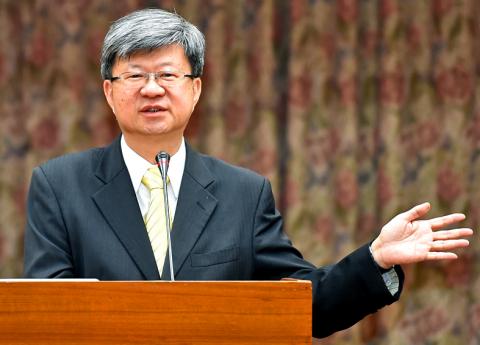Minister of Education Wu Se-hwa (吳思華) yesterday said that one of his greatest legacies is that education authorities at various levels have found no problems with the controversial curriculum guidelines.
Wu made the remark during his last question-and-answer session at a meeting of the legislature’s Education and Culture Committee, where lawmakers were discussing a proposal to abolish the controversial high-school history curriculum guidelines.
Chinese Nationalist Party (KMT) Legislator Ko Chih-en (柯志恩) asked Wu what achievements he was most proud of from his tenure as minister.

Photo: Chu Pei-hsiung, Taipei Times
Wu said the Ministry of Education had “bravely” stood up to the problems created by changes to guidelines and that despite the vastly different political views held by different groups, he was glad that education officials were able to demonstrate solidarity and internal harmony, as “from central to local government levels, we did not see any problems related to controversial curriculum guidelines.”
Wu’s remarks drew criticism from Democratic Progressive Party (DPP) Legislator Rosalia Wu (吳思瑤), who said that they were a far cry from the public’s understanding.
Rosalia Wu said that if the minister were to look himself up on the Chinese-language Wikipedia, he would see an entire section titled “Controversy on High School History Curriculum Guideline Alterations,” and she urged him not to dodge problems.
She said that had Wu Se-hwa’s bureaucrats not delayed communicating with protesters, who demonstrated last year from May until July, the students would not have breached the ministry compound in Taipei and the denouement where the ministry asked police to arrest students and pressed charges against them would not have occurred.
She asked him how he would respond to the protesters if he had a second chance.
Wu Se-hwa said he had attended a meeting with some of the protesters at National Taichung First Senior High School, where he saw that the students were being manipulated by “certain individuals.”
Rosalia Wu demanded that Wu Se-hwa name names, but the minister said: “I suggest that the Legislative Yuan establish a truth commission” to investigate possible instigators.
Rosalia Wu said the minister was not in a position to give orders to the incoming government of president-elect Tsai Ing-wen (蔡英文), just as he earlier in the day urged the incoming Cabinet to propose a draft bill on reshuffling the curriculum guidelines review committee and suggested that legislators drop the issue until then.
“If you believe this is something that needs to be done, you should propose a draft bill now,” she said.

DAREDEVIL: Honnold said it had always been a dream of his to climb Taipei 101, while a Netflix producer said the skyscraper was ‘a real icon of this country’ US climber Alex Honnold yesterday took on Taiwan’s tallest building, becoming the first person to scale Taipei 101 without a rope, harness or safety net. Hundreds of spectators gathered at the base of the 101-story skyscraper to watch Honnold, 40, embark on his daredevil feat, which was also broadcast live on Netflix. Dressed in a red T-shirt and yellow custom-made climbing shoes, Honnold swiftly moved up the southeast face of the glass and steel building. At one point, he stepped onto a platform midway up to wave down at fans and onlookers who were taking photos. People watching from inside

A Vietnamese migrant worker yesterday won NT$12 million (US$379,627) on a Lunar New Year scratch card in Kaohsiung as part of Taiwan Lottery Co’s (台灣彩券) “NT$12 Million Grand Fortune” (1200萬大吉利) game. The man was the first top-prize winner of the new game launched on Jan. 6 to mark the Lunar New Year. Three Vietnamese migrant workers visited a Taiwan Lottery shop on Xinyue Street in Kaohsiung’s Gangshan District (崗山), a store representative said. The player bought multiple tickets and, after winning nothing, held the final lottery ticket in one hand and rubbed the store’s statue of the Maitreya Buddha’s belly with the other,

‘COMMITTED TO DETERRENCE’: Washington would stand by its allies, but it can only help as much as countries help themselves, Raymond Greene said The US is committed to deterrence in the first island chain, but it should not bear the burden alone, as “freedom is not free,” American Institute in Taiwan Director Raymond Greene said in a speech at the Institute for National Defense and Security Research’s “Strengthening Resilience: Defense as the Engine of Development” seminar in Taipei yesterday. In the speech, titled “Investing Together and a Secure and Prosperous Future,” Greene highlighted the contributions of US President Donald Trump’s administration to Taiwan’s defense efforts, including the establishment of supply chains for drones and autonomous systems, offers of security assistance and the expansion of

STREAMLINED: The dedicated funding would allow the US to transfer equipment to Taiwan when needed and order upgraded replacements for stockpiles, a source said The US House of Representatives on Thursday passed a defense appropriations bill totaling US$838.7 billion, of which US$1 billion is to be allocated to reinforcing security cooperation with Taiwan and US$150 million to replace defense articles provided to the nation. These are part of the Consolidated Appropriation Act, which the US House yesterday passed with 341 votes in favor and 88 against. The act must be passed by the US Senate before Friday next week to avoid another government shutdown. The US House Committee on Appropriations on Monday unveiled the act, saying that it allocates US$1 billion for the Taiwan Security Cooperation Initiative